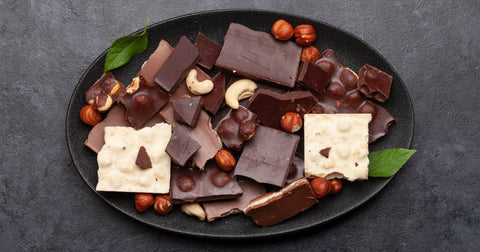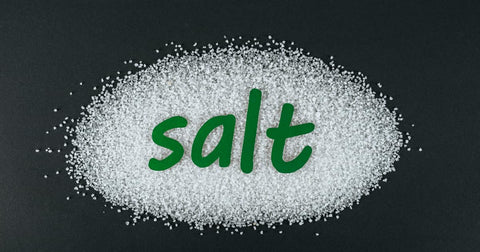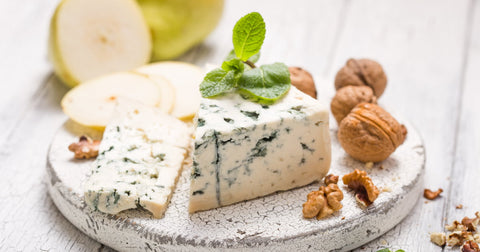Dark chocolate, with its intense flavor and potential health benefits, is a treat that many enjoy. But if you're lactose intolerant or following a dairy-free diet, you might be wondering: "Does dark chocolate have dairy?"

Let's explore the relationship between dark chocolate and dairy, address common concerns, and guide you towards making informed choices about this delectable indulgence.
Understanding Chocolate: From Bean to Bar
To understand the dairy issue, it's helpful to know how is dark chocolate made. The process involves:
1. Harvesting cacao beans: From the cacao tree.
2. Fermenting and drying: To develop flavor.
3. Roasting: To further enhance flavor.
4. Grinding: To create cocoa liquor (a paste).
5. Pressing: To separate cocoa butter (fat) and cocoa solids.
6. Combining: Cocoa liquor, cocoa butter, and sugar (in varying amounts) are combined to make chocolate.
Does Dark Chocolate Have Dairy? The Crucial Distinction
The key difference lies in the ingredients.

-
Dark Chocolate: Is made with cocoa solids, cocoa butter, and sugar.
-
Milk Chocolate: Contains milk solids or other dairy ingredients in addition to the components of dark chocolate.
Therefore, the answer to "Does dark chocolate have dairy?" is: Generally, no.
Is Dark Chocolate Dairy Free? A Closer Look
While the basic recipe doesn't include dairy, it's not always that simple.
-
Pure Dark Chocolate: High-quality, pure dark chocolate with a high cocoa content (70% or higher) should be dairy-free.
-
Added Ingredients: Many dark chocolate bars include added ingredients like milk fat, milk solids, or lactose to improve texture or flavor.
Therefore, not all dark chocolate is dairy-free.
Is Dark Chocolate Vegan?
Is dark chocolate vegan? Again, it depends.
-
Vegan Dark Chocolate: Is made without any animal products, including dairy.
-
Non-Vegan Dark Chocolate: Some dark chocolate may contain milk fat or other non-vegan ingredients.
So, vegan dark chocolate is always dairy-free, but not all dark chocolate is vegan.
Dark Chocolate vs. Milk Chocolate: The Dairy Divide
-
Dark Chocolate: As discussed, typically made without dairy.
-
Milk Chocolate: Always contains dairy in the form of milk solids, milk fat, or other milk-derived ingredients.
Benefits of Dark Chocolate: A Healthy Treat (in moderation)
Dark chocolate, especially with a high cocoa content (70% or higher), offers potential health benefits:

-
Rich in Antioxidants: Dark chocolate is packed with flavonoids, powerful antioxidants that protect cells.
-
May Improve Heart Health: Some studies suggest it can lower blood pressure and improve blood flow.
-
Could Boost Mood: Dark chocolate can stimulate the production of endorphins, natural mood elevators.
Is Dark Chocolate Healthy?
Is dark chocolate healthy? Yes, when consumed in moderation as part of a balanced diet. Choose dark chocolate with a high cocoa content and low added sugar.
Food Intolerance and Chocolate: A Potential Issue
If you experience digestive issues after consuming chocolate, even dark chocolate, it might be due to:
-
Lactose Intolerance: Even trace amounts of dairy in some dark chocolate can trigger symptoms.
-
Sensitivity to other ingredients: Some people are sensitive to caffeine, theobromine, or other compounds in chocolate.
Food Sensitivity Test Kit: Uncover Your Triggers
If you suspect a food intolerance is contributing to your digestive discomfort after eating dark chocolate, a food sensitivity test kit can help identify specific food triggers.
Key Takeaways:

-
Pure dark chocolate is generally dairy-free.
-
Always check the ingredient list for added dairy products.
-
Dark chocolate offers health benefits but should be consumed in moderation.
-
Food intolerances to chocolate components are possible.
Disclaimer: This article is for informational purposes only and does not constitute medical advice. Consult a healthcare professional for personalized guidance on your diet and health.
Frequently Asked Questions:
1. If a dark chocolate bar says "may contain milk," is it safe for someone with a dairy allergy?
No. "May contain milk" labeling indicates that the product was processed in a facility that also processes dairy. This means there's a risk of cross-contamination, even if milk isn't listed as an ingredient. People with a true dairy allergy should avoid these products.
2. What are some common dairy-free dark chocolate brands?
Many brands specialize in vegan or dairy-free chocolate. Look for labels that explicitly state "dairy-free," "vegan," or "milk-free." Some popular brands include Enjoy Life, Hu Kitchen, and Pascha Chocolate.
3. Does dark chocolate have any health benefits for women?
Yes, dark chocolate (with high cocoa content) is rich in antioxidants, which can benefit cardiovascular health, skin health, and may even improve mood. However, it's important to consume it in moderation due to its calorie content.
4. I experience bloating and gas after eating dark chocolate. Could it be a food intolerance?
Yes, it's possible to have a sensitivity or intolerance to components in chocolate, such as cocoa, caffeine, or even soy lecithin (an emulsifier often used in chocolate). A food sensitivity test can help identify potential triggers.
5. Is white chocolate dairy-free?
No. White chocolate is always made with milk or milk-derived ingredients. It does not contain cocoa solids, which give dark chocolate its color and many of its health benefits.


.png?v=1737390083)
.png?v=1737187409)

